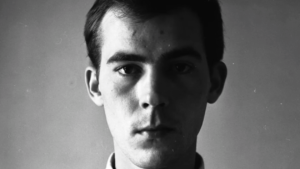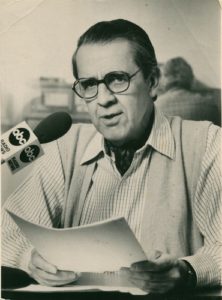The Importance of Being Hunter
From the Orlando Sentinel, January 28, 2001

It must be hard to be Hunter Thompson.
After all, Thompson set the standard as America’s most influential outlaw journalist. With works such as Fear and Loathing in Las Vegas, he obliterated the lines separating fact and fiction. But paying his utility bills may be his greatest accomplishment.
That’s probably one of the most interesting revelations in Fear and Loathing in America, the second of Thompson’s three collections of letters from his lifetime of correspondence.

These letters cover a grim period in our history (1968-1976: civil rights, Vietnam, Watergate) but those years were great artistically for Thompson. He’d just published Hell’s Angels and produced Fear and Loathing in Las Vegas and his monumental Rolling Stone coverage of the 1972 presidential campaign.
So here he is, revolutionizing the writing of nonfiction and reporting on America better than anyone of the time. And yet a lot of these letters are pleas for money from agents, editors and others who disappointed him.
It’s kind of depressing in a way. Here’s a writer at the top of his form yet the agonies of day-to-day existence still daunt the dude.
But don’t get the idea that Thompson is whining in these letters. Quite the contrary. In fact, he routinely offers to rip the throats out of editors who welsh on their contracts or who are too slow to reimburse him for expenses. When American Express cuts him off after the spending-spree (a quaint amount by today’s standard) that produced Fear and Loathing in Las Vegas, Thompson viciously tears into the AmEx underling who thwarts him. “After three expensive efforts (to reach you), I got tired of talking to people who could barely speak English – much less understand what I was saying. How would you feel if you kept calling my house for prolonged conversations with my seven-year-old son? He deals with any calls I don’t feel like taking.”

Friends, of course, are used to this treatment. CBS correspondent Hughes Rudd stood up Thompson for a drink because he was hospitalized with a heart attack. Ever sympathetic, Thompson shows his concern in his usual way: “Dear Hughes: **** off with your excuses about why you didn’t show up at Miller’s Pub on Thursday night. So you had a ****ing heart attack … so what? Are you some kind of pansy? Hell, you should have just had the ambulance take you from the Amphitheatre to the Pub, not the hospital. The next time I plan to meet you anywhere for a drink I’ll know what to expect.”
Hunter Thompson is like bourbon . . . or the Interstate Highway System – totally American and essential, yet often taken for granted. Like those two national glories, Thompson usually packs a wallop and takes us somewhere interesting.
The first collection of Thompson’s letters, The Proud Highway (1997), showed a young writer, pre-fame, confident enough to make carbon copies of all of his letters, assuming they would make interesting reading some day. They did. The Proud Highway was a loose portrait of the artist as a young man.
Fear and Loathing in America will take its place as one of Thompson’s most essential books. As he manages to keep the taxman and other debtors from his door, he lives and writes the scorching, epochal sensation that is Fear and Loathing in Las Vegas. He explains it in a letter to Tom Wolfe (whom he calls, lovingly, “a thieving pile of albino warts”): “The first draft . . . was written by hand on Mint Hotel stationery during and all-night drunk/drug frenzy while I waited for dawn to come up so I could flee without paying. . . . What I was trying to get at in this was mind-warp / photo technique of instant journalism: One draft, written on the spot at top speed and basically un-revised, edited, chopped, larded, etc. for publication. Ideally, I’d like to walk away from a scene and mail my notebook to the editor, who will then carry it, untouched, to the printer.”

The skill and grace in these letters of Thompson’s makes it pretty clear that he is one of the few writers who could get by without heavy editing.
One of Thompson’s continuing issues in these letters is his supposed Big Book, commissioned by Random House at the end of the 1960s, that was supposed to be about “The Death of the American Dream.” Thompson tried to wrestle his whole world into this book and part of the concept eventually led to Fear and Loathing in Las Vegas. And yet that still was not the big American Dream book his publisher wanted. Maybe, three decades later, Fear and Loathing in America is that book. He’d been writing his testament all along, but it was hiding in plain sight next to his typewriter.
